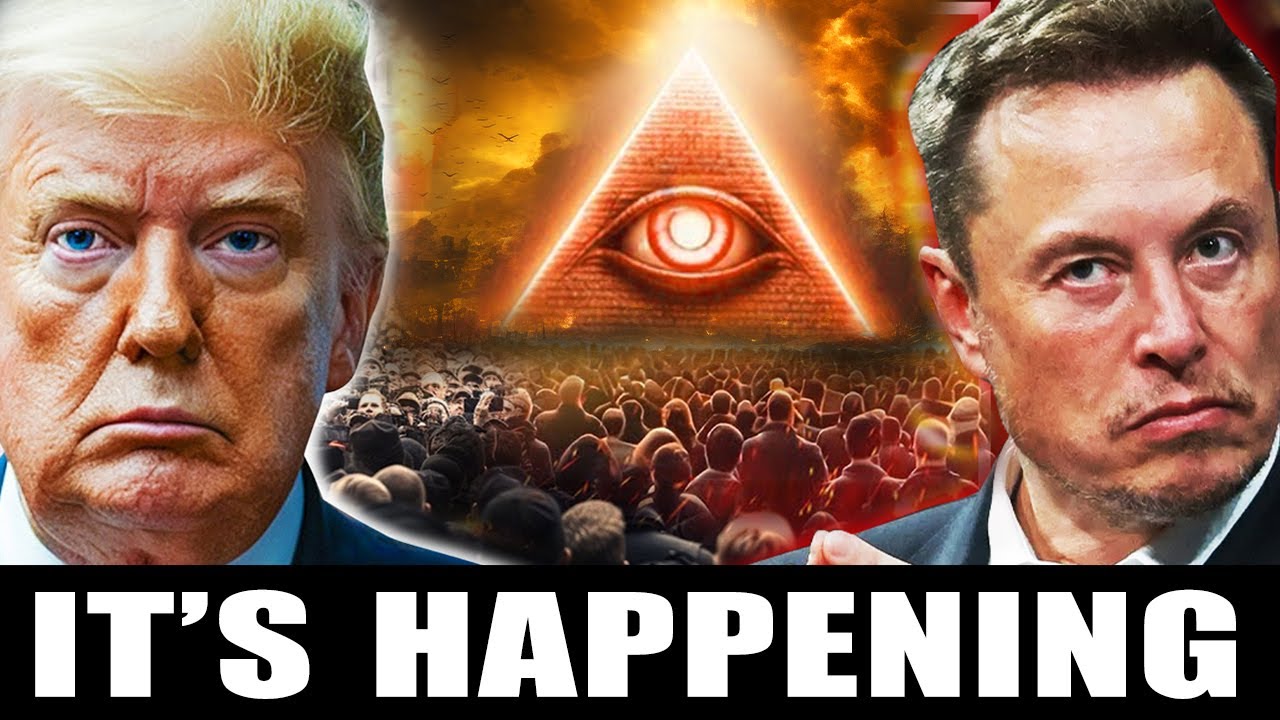The Darkest Events Unfolding That No One Talks About It

The concept of the “mark of the beast,” originating from Revelation 13:16-18, has intrigued scholars and believers alike. Many theories exist about what this mark might be, with some suggesting it could be a technological implant, like a microchip, or a barcode system. However, the original Greek term for “mark” points to something more visible, like a tattoo or branding, placed on the right hand or forehead. This symbol is often seen as a sign of allegiance to a political or religious authority.
The mark is linked to the ability to engage in commerce, with Revelation suggesting those without it may face restrictions in buying or selling, implying economic consequences for non-compliance. Some scholars compare the mark to historical forced allegiances, like branding of slaves, symbolizing not just submission but exclusion from society.
The number 666, associated with the beast, is often interpreted as a symbol of failure and imperfection, in contrast to the number seven, which represents perfection. Some believe the mark also symbolizes loyalty to the Antichrist, a figure central to the prophecy.
The tribulation period, as described in the Bible, spans seven years and is marked by intense suffering, leading to the rise of the Antichrist, who will control global governance and economics. This period is often divided into two halves: the first, a time of apparent peace, followed by a second half of terror and oppression.
The idea of a centralized, global authority controlling economic transactions seems more plausible today, with technological advancements and globalization. The mark of the beast could be a tool of control, and some believe its fulfillment will coincide with the arrival of the Antichrist.
The battle of Armageddon, described in Revelation, is seen as a climactic event where good and evil will clash, leading to Christ’s second coming. This event will culminate in a new era of peace and righteousness. The establishment of Israel in 1948 is considered a fulfillment of biblical prophecy, with significant geopolitical implications for the end times.
Current geopolitical tensions, especially in the Middle East, have led many to speculate that biblical prophecies are unfolding, signaling the imminent return of Christ. The New Testament urges believers to remain vigilant and prepared, living lives marked by faith, hope, and love as they anticipate Christ’s return.
John Rich discusses ancient prophecies, such as those in Revelation, which seem increasingly relevant in today’s world, particularly regarding the rise of AI, holography, and biometric identification. These technologies might fulfill biblical predictions, including the creation of lifelike entities with the power to influence and control. Revelation 13:15 mentions a “Beast” image that could speak and enforce worship, a scenario that resonates with current AI and robotic advancements. These developments raise concerns about manipulation, control, and ethical issues.
The “Mark of the Beast” in Revelation 13:16-17 suggests an economic system requiring loyalty through a mark, similar to modern biometric technologies like facial recognition or implanted chips. These could lead to a future where participation in the economy depends on such identification. Advocates argue these innovations enhance security, but concerns about privacy and government overreach persist.
In Revelation, two powerful beasts are described: the first symbolizes a totalitarian leader, while the second represents religious deception. Both beasts combine political and religious power, reflecting historical patterns like the Roman Empire’s use of religion to legitimize authority. The “Mark of the Beast” is tied to economic control and compliance, echoing modern fears of surveillance and loss of freedom.
Biblical prophecies, especially those about the Antichrist, raise questions about authority and control, warning against the dangers of authoritarian regimes. Modern leaders’ decisions are often influenced by spiritual forces, echoing the influence of evil powers seen in biblical history. Revelation offers a vision of the future, urging believers to stay vigilant, prepared, and focused on Christ’s return.
As technology advances, its connection to biblical prophecy calls for deep reflection. Believers are encouraged to stay informed and engaged with world events while maintaining spiritual readiness, guided by Christ’s teachings. The fulfillment of prophecies serves as a reminder to live intentionally, share love, and stay prepared for the return of Jesus Christ.
The Battle of Gog and Magog is discussed in two key biblical books: Ezekiel and Revelation. Each passage describes different events with distinct purposes in God’s plan.
Theory 1: Pre-Tribulation Battle The first theory suggests the battle takes place before the tribulation, when Israel is stable enough to deal with the conflict. This would allow Israel to handle the aftermath without the chaos of the tribulation. It also fits into the broader prophetic timeline, leaving room for other significant events before the tribulation begins.
Theory 2: During the Tribulation The second theory places the battle at the start of the 7-year tribulation. Israel would be in a temporary state of peace due to a covenant with the Antichrist. This peace makes Israel vulnerable when Gog and his army attack, fitting the tribulation’s pattern of false security followed by devastation. The battle emphasizes God’s power and judgment, leading to chaos within Gog’s forces and divine intervention.
The Battle in Ezekiel In Ezekiel, God commands Gog to invade Israel. This invasion will bring destruction, causing a great shaking and divine intervention, with Gog’s army fighting among themselves. The aftermath will take seven months to bury the dead and seven years to dispose of weapons, highlighting the scale of the destruction. This event serves to reveal God’s holiness and power, restoring peace in Israel.
The Battle in Revelation In Revelation, the battle occurs after Christ’s 1,000-year reign (the Millennium). Satan, released from prison, leads a global coalition against the Saints and Jerusalem. Unlike the localized battle in Ezekiel, this rebellion is universal, with Satan as the central instigator. Fire from heaven destroys the invaders, and Satan is cast into the lake of fire, marking the final defeat of evil.
Key Differences
- Ezekiel’s battle happens before or during the tribulation and focuses on Israel’s restoration.
- Revelation’s battle occurs after the Millennium and marks the final rebellion before God’s new creation.
- Ezekiel’s aftermath is focused on burying the dead and cleaning up, while Revelation is a swift, final judgment.
God’s Sovereignty Both battles show God’s ultimate control over history. He is sovereign over all creation, from governments to nature, and guides all things according to His will. His sovereignty reassures believers that everything, including personal trials and global events, is under His control. God’s sovereignty is a source of peace and hope, even in chaotic times.
Faith and Justice God’s authority is a reminder to live authentically, following Christ’s teachings. Despite the world’s chaos, God’s judgment is sure, and His justice will prevail. This calls believers to stay watchful, resist temptation, and embody the truth of the gospel. Through God’s sovereignty and grace, we can trust that He is working all things together for good.
The World Economic Forum has warned of heightened global risks and destabilizing events in the post-pandemic era. This may sound alarming, but the Bible has already forewarned us about such events. Scriptures like 2 Timothy 3:1 and Luke 21:25-26 describe troubling times in the last days, with signs in the heavens and global turmoil. For believers, this isn’t cause for fear but a reminder that God is with us.
The article also discusses extreme climate events, rising mental health challenges, and the increasing impact of AI on people’s lives, especially as many feel left behind. Despite these difficulties, there is a spiritual awakening, although society is also facing moral decay. As the devil intensifies his efforts, more people are turning to Christ for hope and peace.
To navigate these uncertain times, it’s essential to evaluate our hearts and motivations. We need to recognize that we cannot discern truth on our own and need Jesus to guide us. According to 1 Thessalonians 5:23, we are spirit, soul, and body, and the battle between good and evil happens in our hearts. Proverbs 4:23 urges us to guard our hearts, as everything flows from them. Without Christ, we cannot overcome sin or love as we should.
God may allow challenges in our lives to remind us of our need for Him. 1 Peter 4:17-19 reflects on the judgment that begins with the household of God, serving as a reminder that those who claim to follow Christ will face judgment first. We must prepare ourselves for this judgment, as Matthew 7:21-23 warns that not everyone who claims to follow Christ will be saved.
The Bible calls us to examine ourselves, live with genuine faith, and love others as Christ does. Matthew 6:1 and Matthew 7:21-23 remind us that external actions alone are not enough; our hearts must be aligned with God. We must love our brothers and sisters in Christ and ensure that our faith is sincere, not just outwardly performed.
In the face of global unrest and personal struggles, we are reminded of five essential commands in the Bible to navigate uncertain times:
- Keep Watch (Matthew 24:42) – Stay alert and focused on Christ, despite the world’s chaos.
- Watch and Pray (Matthew 26:41, Luke 21:36) – Pray to avoid temptation and remain worthy of escape from God’s judgment.
- Be Earnest in Prayer (1 Peter 4:7) – Stay sober and disciplined in your spiritual life.
- Be Clear in Your Mission (2 Timothy 4:5) – Stay focused on spreading the gospel, even through hardship.
- Stay Focused on Christ – Regardless of the times, keep your focus on Him and remain steadfast in faith.
Finally, while the rise of global identification systems and biometric tracking may seem alarming, it raises significant concerns about privacy and surveillance, leading some to see it as fulfilling biblical prophecy about the Antichrist’s control. These systems, designed to enhance security, also raise ethical and privacy issues, particularly regarding government surveillance and the risk of identity theft.
In conclusion, we are called to stay vigilant and spiritually aware, keeping our focus on Christ in the face of global challenges and moral decline. Our hope rests in Him alone.
Surveillance systems may pave the way for the Antichrist, as foretold in the Bible. The Book of Revelation describes a future mark of the beast that will be imposed on all people, allowing them to buy and sell only if they bear this mark on their hand or forehead. This implies a future where commercial and social systems are linked to a symbol of allegiance to the Antichrist, and refusing the mark would result in exclusion and economic hardship.
Current technological advancements in digital IDs and biometric tracking could provide a framework for this global control system, which, if misused, could lead to the fulfillment of the prophecy. Some Christian thinkers view digital currencies and biometric IDs as gradual steps toward this system. They argue that these technologies could enable authorities to restrict access to resources, enforcing societal or ideological conformity. Those who refuse the mark could face exclusion from essential services and resources.
The Book of Revelation portrays the Antichrist’s power and influence as immense. The beast, an agent of Satan, is described as having ten horns and seven heads, symbolizing strength, authority, and global influence. The crowns on the horns indicate power given not by the people or God, but by Satan to oppose God. The Antichrist’s rise will involve global control, including suppressing religious freedom and demanding worship of himself and Satan.
The Antichrist’s death and resurrection, symbolized by a fatal wound being healed, will astonish the world and lead many to follow him. This resurrection serves to imitate the resurrection of Christ, deceiving people into believing in his divine power. The Antichrist will speak blasphemously against God and attempt to rewrite sacred truths, leading people to worship him.
Despite the trials and suffering that will come with the Antichrist’s rule, Christians are assured of Christ’s ultimate victory. Revelation 13 serves as a call to remain vigilant in faith, trusting in God’s power over the Antichrist’s deceptions. Believers are encouraged to stay grounded in the teachings of Christ and the Holy Spirit, using discernment to avoid false teachings and ideologies.
God’s light will ultimately prevail over darkness, and those who remain faithful will be secure in the Lamb’s Book of Life, signifying eternal security in God’s kingdom. In times of trial and adversity, Christians are called to focus on God’s strength and guidance, trusting in His power to restore and deliver. Through prayer, faith, and reliance on God, believers can overcome life’s obstacles and experience spiritual transformation.








